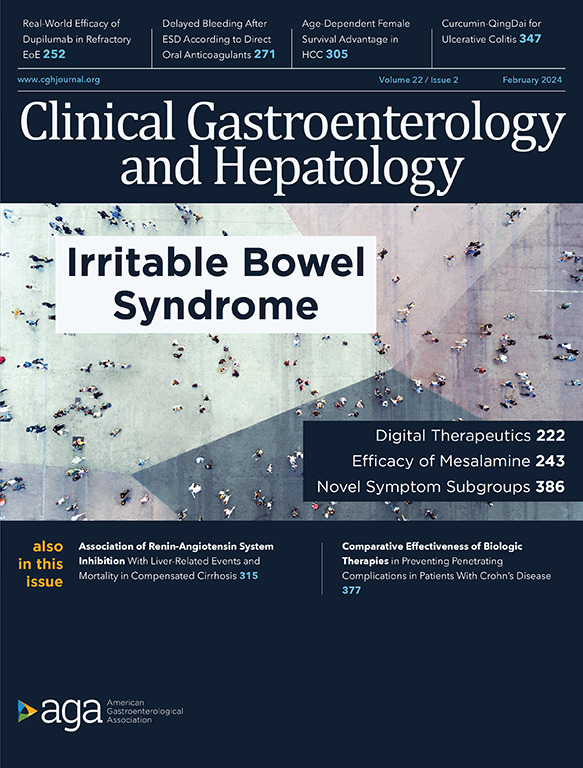Is a Simplified, Less Restrictive Low FODMAP Diet Possible? Results From a Double-Blind, Pilot Randomized Controlled Trial
IF 11.6
1区 医学
Q1 GASTROENTEROLOGY & HEPATOLOGY
引用次数: 0
简化的、限制较少的低 FODMAP 饮食可行吗?双盲随机对照试验的结果。
低可发酵低聚糖、单糖、双糖和多元醇(FODMAPs)饮食(LFD)是肠易激综合征(IBS)患者最有依据的饮食疗法。1 然而,目前低可发酵低聚糖饮食的降级方法有很大的局限性,包括成本高、复杂、耗时,而且与一些微量营养素的膳食摄入量减少有关。2,5,6 在一项双盲试验中,发现果聚糖和半乳寡糖是最有可能引发肠易激综合征症状的 FODMAP 亚组。7 迄今为止,还没有研究比较过传统的低脂饮食限制阶段与更具针对性或简化的限制阶段的疗效。在一项双盲、试点可行性随机对照试验中,我们比较了在腹泻性肠易激综合征(IBS-D)患者中实施为期 4 周的 FODMAP 简易限制阶段(仅消除果聚糖和半乳寡糖)和传统 LFD 限制阶段的疗效(ClinicalTrials.gov 注册号 NCT05831306)。
本文章由计算机程序翻译,如有差异,请以英文原文为准。
求助全文
约1分钟内获得全文
求助全文
来源期刊
CiteScore
16.90
自引率
4.80%
发文量
903
审稿时长
22 days
期刊介绍:
Clinical Gastroenterology and Hepatology (CGH) is dedicated to offering readers a comprehensive exploration of themes in clinical gastroenterology and hepatology. Encompassing diagnostic, endoscopic, interventional, and therapeutic advances, the journal covers areas such as cancer, inflammatory diseases, functional gastrointestinal disorders, nutrition, absorption, and secretion.
As a peer-reviewed publication, CGH features original articles and scholarly reviews, ensuring immediate relevance to the practice of gastroenterology and hepatology. Beyond peer-reviewed content, the journal includes invited key reviews and articles on endoscopy/practice-based technology, health-care policy, and practice management. Multimedia elements, including images, video abstracts, and podcasts, enhance the reader's experience. CGH remains actively engaged with its audience through updates and commentary shared via platforms such as Facebook and Twitter.

 求助内容:
求助内容: 应助结果提醒方式:
应助结果提醒方式:


